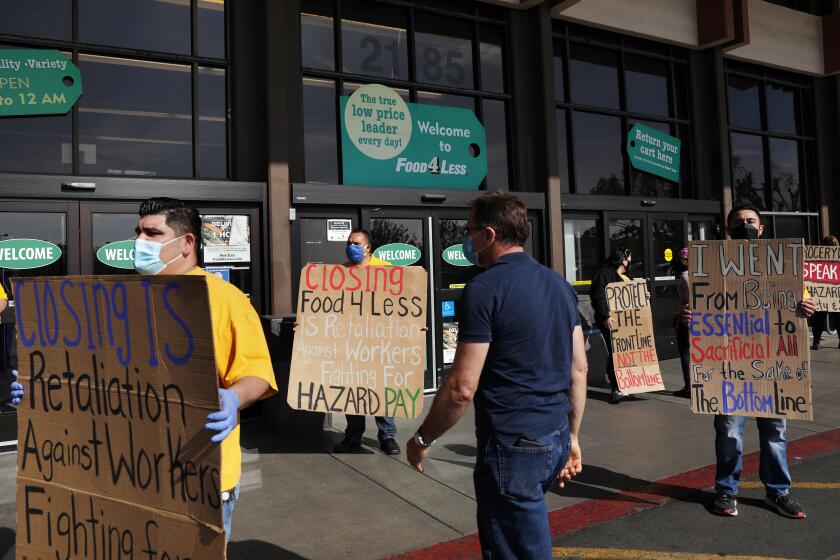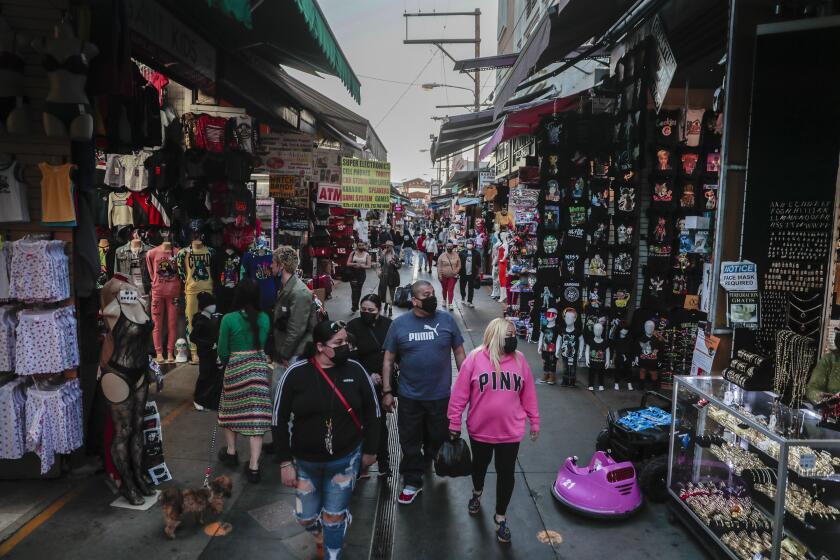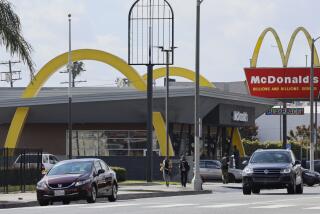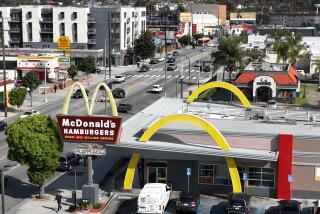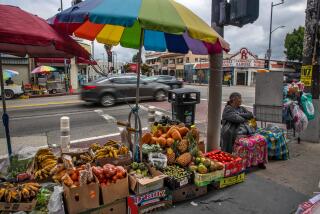L.A. County approves ‘hero pay’ mandate of $5 an hour for grocery workers
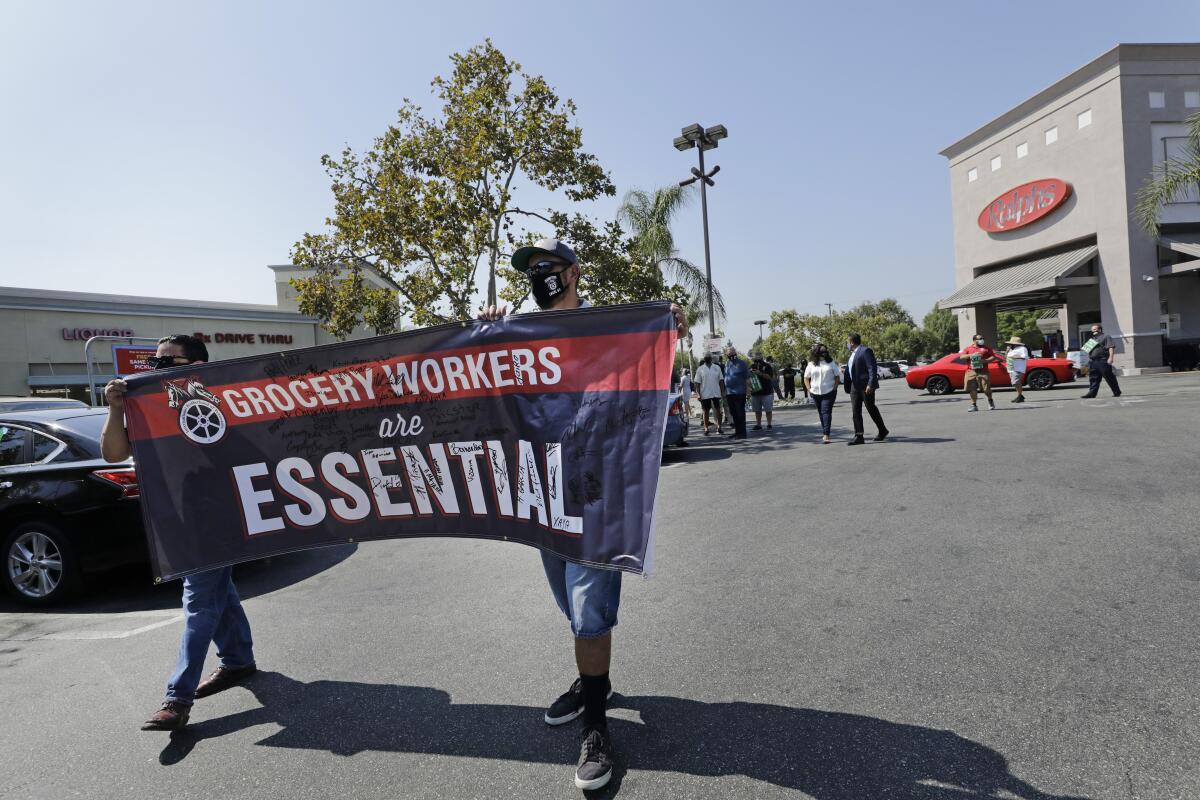
Hundreds of grocery store workers in unincorporated Los Angeles County will receive $5 an hour in hazard pay on top of their regular wages as part of the county’s “hero pay” mandate that goes into effect Friday and lasts 120 days.
The L.A. County Board of Supervisors voted 4-1 Tuesday to mandate the pay bump for publicly traded grocery store or retail drug companies, or companies that have at least 300 employees nationwide and more than 10 employees per store site. The measure applies only to unincorporated areas, benefiting about 2,500 hourly grocery store workers.
“These workers ... have put their lives on the line since the beginning of the pandemic to keep our food supply chain running and provide access to medicine our families need,” Supervisor Hilda Solis, who authored the motion, said in a statement. “Many are working in fear and without adequate financial support, while their employers continue to see profits grow and top executives receive steep pay bonuses.”
Supervisor Kathryn Barger voted against the measure, saying she felt that it leaves out many essential workers and that it could have unintended consequences.
Barger said officials have worked hard to bring retailers to food deserts in unincorporated areas, such as Grocery Outlet in Altadena, which has donated food for food drives during the pandemic.
“I would hate to think we’re driving [out of business] the very businesses we fought so hard to locate in unincorporated areas, many of which are working class neighborhoods ... and that’s why I can’t vote for this,” said Barger, the only Republican on the board.
Since January, several cities, including Santa Monica, San Jose, Berkeley and West Hollywood, have considered or passed some level of hazard pay mandates.
The county’s ordinance will probably be challenged in court in the coming days by the California Grocers Assn., which has sued the city of Long Beach after it passed its “hero pay” measure.
“We’re going to be forced to sue [the county] if it passes, and that’s just unfortunate because it means we will comply obviously with an ordinance that has been passed legally, and the time clock starts as to making it harder for independent businesses doing business in the county of Los Angeles,” said Ron Fong, president and chief executive at the California Grocers Assn., which represents more than 300 retailers operating more than 6,000 stores.
The association and local Chamber of Commerce groups have resisted these mandates, arguing that they unfairly target grocers who operate businesses with low profit margins and thus do not have the capital to absorb these costs. Opponents have also pointed to millions of dollars that grocers have already provided in pay increases, bonuses and paid leave since the pandemic began.
Few essential workers have been hit harder by the pandemic than grocery store workers, who worked all through the lockdown. Now as cases drop and vaccine supplies run low, these workers are unsure when they will get inoculated. Adding to the stress is a political battle over granting grocery workers “hero pay.”
The mandate’s biggest proponent, the United Food and Commercial Workers International Union, has countered those arguments, pointing to the millions made by grocery stores as more customers eat at home during the pandemic, and to the bravery of their members who showed up to work in the face of a virus that could kill them or their families.
At least 5,500 union and nonunion workers at several grocery stores across Southern California have contracted the virus since March, with at least 428 infected in November during the winter surge, according to data collected by United Food and Commercial Workers International Union Local 770.
“Each passing day without hazard pay our members face tremendous risks on the job, all while contributing to the record profits chain grocery stores make as they remain open and busy,” said John Grant, president of the UFCW Local 770, in a statement.
The L.A. City Council will consider its own “hero pay” ordinance on Wednesday.
A new city report found that a spike in sales from people stockpiling groceries in the early months of the COVID-19 pandemic was temporary and didn’t translate into a profitability trend for stores.
Kroger and Albertsons saw big boosts in early 2020, the report found. Still, the “companies did not earn above-average profits until the first quarter of 2020 during the COVID-19 shopping spike and by the third quarter had dropped below the average,” the report found. (The county did not complete a similar analysis.)
Retailers will probably try to absorb the costs because they have to remain competitive, but they could close underperforming stores, which could include locations in smaller suburbs, low-income neighbors with high numbers of dollar stores, and in rural areas, said Neil Saunders, a retail analyst at GlobalData.
“Or it could be a particularly weak or older store in a vibrant neighborhood where newer and better retailers have opened there,” Saunders said.
Saunders said grocers have found, especially during the pandemic, that although grocery delivery has grown in popularity, higher labor and transportation costs make the service not profitable.
“If you keep messing around with pay, the grocers will start to say ‘OK, let’s see where we can cut labor out,’” Saunders said, adding that Kroger has starting testing stores that do not have registers and instead are self-service only.
Some worry about how a patchwork of “hero pay” mandates sprouting up across L.A. County.
The county’s ordinance applies only to unincorporated areas, which includes portions of South L.A. and much of northern L.A. County. Many of the 88 cities in the county do not have measures, meaning a worker can live in one city with a mandate but work in another without it.
A mandate should apply to all workers and not be paid by grocery stores but instead through state and federal money, said Burt P. Flickinger III, manager director at Strategic Resource Group, a retail and consumer goods consulting firm.
“There should be a collective effort between Sacramento, the county and ... Washington to include these poor workers who have died, have gotten sick, have had their families tragically impacted, to get hero pay, but the hero pay, ethically and financially, should come out of the COVID-19 relief bill,” said Flickinger, who has previously worked with labor unions that represent grocery store workers.
Even though daily coronavirus case counts are tumbling, Los Angeles County has now recorded 20,000 COVID-19 deaths.
How much effect could a hazard pay mandate really have if only lasts a few months?
Data show that before the pandemic, California families ate, on average, 10 meals at home, and 11 away from home. In the last year, far more families are eating at home and thus spending significantly more money on their grocery bills, Flickinger said.
But as government restrictions and fear around eating at restaurants declines, people will return to their old eating habits, he said.
Grocery sales “will drop significantly, and with sales dropping significantly, the operating profit per store per property will drop significantly as well,” he said.
This could lead some retailers to close underperforming stores to make up for the cost of “hero pay.”
Times staff writers Dakota Smith, Ruben Vives and Suhauna Hussain contributed to this report.
More to Read
Start your day right
Sign up for Essential California for news, features and recommendations from the L.A. Times and beyond in your inbox six days a week.
You may occasionally receive promotional content from the Los Angeles Times.
